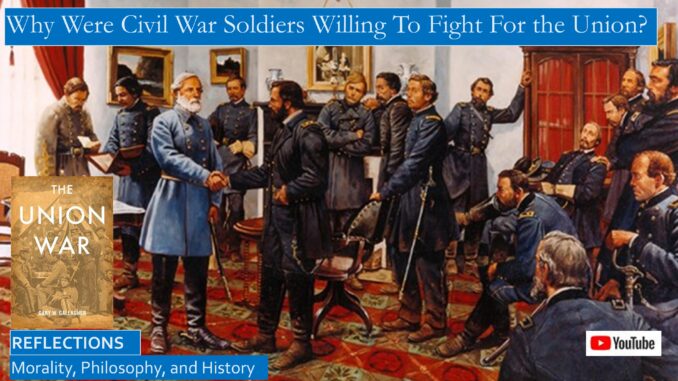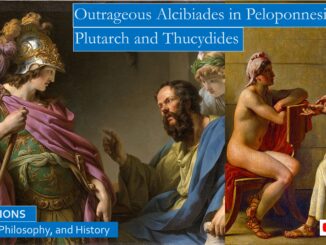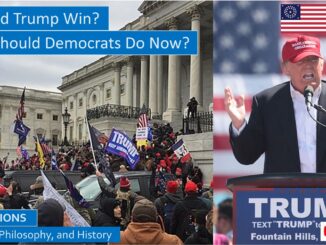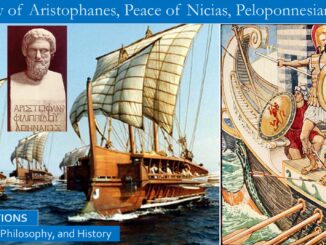
Wondrium had sponsored an online discussion featuring Professor Gary Gallagher and his Civil War lectures, and I was able to ask the good professor two questions.
My first question was whether many Northerners suspected that if the North sued for peace rather than calling up troops after South Carolina shelled Fort Sumter, that this would only delay the inevitable Civil War. The reason war would be inevitable is that the two nations would eventually come to blows over whether newly settled states in the western territories would be admitted to the Confederacy as slave states, or be admitted as free labor states in the Union. Professor Gallagher answered that indeed, this was the fear of many informed citizens before the Civil War.
The YouTube video for this blog, with paintings and photographs: https://youtu.be/0aak9Mtt0eI
Script for this video, with more Amazon book links: https://www.slideshare.net/BruceStrom1/why-were-northern-soldiers-eager-to-fight-to-preserve-the-union
My second question was, Why Were Northern Soldiers Eager to Fight to Preserve the Union? Which seems to be a rather abstract cause to give the ultimate sacrifice of your life.
We know from our prior reflections that while the Confederate Southern states definitely seceded to preserve the institution of slavery, and while many liberal Northerners were abolitionists, fighting to abolish slavery, that the average Northern citizen was not eager to end slavery, and many Northerners shared the racism of their Confederate cousins. Professor Gallagher said he answered this question in his book, The Union War, we will reflect on this book in this lecture.
https://youtu.be/UciDV5laOLg and https://youtu.be/89ulb20cy8Q and https://youtu.be/JeRCM4PAqPk and https://youtu.be/CK4V3e-TPFU
Professor Gallagher opens his book on the Union War, “The loyal American citizenry fought a war that also killed slavery. In a conflict that stretched across four years and claimed more than 800,000 US casualties, the nation experienced huge swings of civilian and military morale before crushing Confederate resistance. Union always remained the paramount goal, a fact clearly expressed by Abraham Lincoln in speeches and other statements designed to garner the widest popular support for the war effort.”[1]
Soon after the Civil War began, when there was still slim hope the South would reconsider, Lincoln famously said that “my paramount object in this struggle is to save the Union and is not either to save or to destroy slavery. If I could save the Union without freeing any slave, I would do it; and if I could save it by freeing all the slaves I would do it; and if I could save it by freeing some and leaving others alone, I would also do that. What I do about slavery and the colored race, I do because I believe it helps to save the Union; and what I forbear, I forbear because I do not believe it would help to save the Union.”[2] Lincoln definitely showed that he would indeed consider freeing some slaves and not others later in the war, when he issued the Emancipation Proclamation as an executive war decree.
South Carolina would be the first state to secede from the Union and her soldiers fired the first shots at Fort Sumter, but that was not the first time she rebelled against the federal government. South Carolina had previously called a state convention that passed the Ordinance of Nullification in 1832 declaring that some unpopular steep federal tariffs were unconstitutional and unenforceable in South Carolina, then the Congress passed the Force Bill authorizing the vigorous President Andrew Jackson to use military force against South Carolina, while also lowering the tariff. Everyone knew that Jackson would not hesitate, but South Carolina repealed the Ordinance of Nullification, the crisis passed, but a dangerous precedent had been set. [3]
During this crisis, famous speeches by Senator Daniel Webster rejected the compact theory advanced by John C Calhoun of South Carolina. Webster claimed that the Constitution was the product of the people and was not a compact of the various states, who could nullify the compact at will, that only the Supreme Court could rule on the constitutionality of federal laws, not the individual states. Webster’s speech was burned into the consciousness of Americans and recited by many school children, and 150,000 copies of Webster’s speech were distributed, that proclaimed: “Liberty and Union, now and forever, one and inseparable.”[4]
A large majority of Northerners shared Websters deep commitment to the Union cause. Walt Whitman expressed how deeply many in the North felt, “UNIONISM, in its truest and amplest sense, formed the hard-pan of the Northerner’s character, a new virtue, unknown to other lands, and hardly yet really known here, but the foundation and tie of all, as the future will grandly develop.”[5]
The state of mind of Americans before the Civil War was also affected by events in Europe. The Revolutions of 1848 were widespread political upheavals in many countries in Europe seeking to overthrow the monarchies that were put back in place after the French Revolution and the Napoleonic Wars that followed. These were spontaneous uncoordinated revolutions that were mostly suppressed by reactionary forces sympathetic to the monarchies some years later. Some democratic reforms were permanent, the revolutions played out differently in many countries. In France, the Second Republic was established, but was overthrown when Napoleon III gained dictatorial powers through a coup. There was little actual change in most countries, though the monarchies were reminded that running roughshod over the middle and lower classes posed political risks.[6]
Another famous speech by Daniel Webster in 1850 proclaimed that though sectional tensions were tested by slavery, that the American model of government excelled when compared to the monarchies of Europe. “We have a great, popular, constitutional government guarded by law and by judicature, and defended by the affection of the whole people. No monarchial throne presses these states together, no iron chain of military power encircles them; they live and stand under a government popular in its form, representative in its charter, founded upon principles of equality, and so constructed, we hope, as to last forever.”[7]
FREE SOIL PARTY MERGES INTO REPUBLICAN PARTY
To understand Northern sentiment, we also need to know how the political parties formed and broke apart as Northern attitudes toward slavery changed. Although the Democratic-Republican Party has been in existence since the founding of our Republic, there have been several opposing parties.
The Federalist Party, strongest in the Northeastern states, was the first opposition party, George Washington and Alexander Hamilton were prominent Federalists. Many Federalists favored Great Britain before the War of 1812, which was fought against Great Britain. Due to these sentiments, after the war the Federalist Party collapsed, [8] and eventually the opposition coalesced into a new Whig Party, which the young Lincoln joined. The Whig Party was truly a national party, but it collapsed as its Southern and Northern wings clashed over slavery.[9]
Many Whigs, including Abraham Lincoln, joined the Free-Soil Party, which lasted from 1848 to 1854, when it merged into the newly formed Republican Party. The Free-Soil Party did not oppose slavery everywhere but focused on the single issue of opposing the expansion of slavery into the western territories of the United States. Former President Martin Van Buren ran for reelection in 1848 with the campaign slogan, Free Soil, Free Labor, Free Speech. What many outside the South feared was that slaves would undercut the small white yeoman farmers and other free laborers with cheap slave labor.[10]
There was never overwhelming popular support among Northerners to abolish slavery, let alone popular support for black civil rights and black suffrage. The three Reconstruction Amendments guaranteeing blacks these rights and citizenship would have never passed if the Southern states had not been compelled to adopt them as a condition for re-admittance into the Union after the war.
For the 1860 Presidential election, the Democratic Party split into a northern wing, nominating Stephen Douglas of Illinois, who only won Missouri, and the Southern wing, nominating John Breckinridge of Kentucky, who won in eleven Southern states. The newly formed Constitutional Union Party nominated John Bell of Tennessee, who won three border states. Abraham Lincoln carried eighteen states running as the Republican nominee, winning a majority in the Electoral College, although he won only about forty percent of the popular vote.
After the election, but before Lincoln was sworn into office in March 1861, seven states seceded from the Union to form the Confederate States of America. After Lincoln was sworn in as President, the South Carolina fired the first shots of the Civil War at the federal garrison at Fort Sumter in Charleston Harbor. After President Lincoln called for federal troops to put down the rebellion, four more Southern states seceded from the Union. The Civil War had begun.[11]
FIGHTING TO PRESERVE THE UNION, NOT TO END SLAVERY
After he was reelected President in 1864, after the Republican majority in Congress increased, Abraham Lincoln appealed to Congress to reconsider passing the Thirteenth Amendment abolishing slavery. Each house of Congress needed to pass the Amendment by a two-thirds majority before sending it to the states, but in an earlier vote before the election, the House of Representatives failed to approve this amendment.
Lincoln appealed to Congress to now pass the Thirteenth Amendment by appealing to the Union cause: “In a great national crisis, like ours, unanimity of action among those seeking a common end is very desirable, almost indispensable. In this case, the common end is the maintenance of the Union,” and the amendment stood “among the means to secure that end.” At this point of the war, preservation of the Union could be accomplished by the abolition of slavery, as slavery was an internal threat to maintaining the Union, as slaveholders were seen as violating the rule of law in seceding to preserve slavery.[12]
One practical reason why Northerners fought to preserve the Union rather than to guarantee civil rights for blacks is that very few blacks lived in Northern states before and during the Civil War. The North was a white republic.[13] We see this in WEB Du Bois autobiography, he was born in Massachusetts after the Civil War, he was the only black in his class, and one of the few blacks in his neighborhood. There was no thought of banning him from attending public schools, and he was granted scholarships to attend college, but he did suffer social discrimination that worsened as he neared adulthood.
Other histories discuss how many Northerners were offended by how quickly the Southern states seceded after Abraham Lincoln’s election. Professor Gallagher discusses this in his Wondrium Civil War lectures, which we reference in our summary of the Yale University undergraduate YouTube courses on the Civil War. Secession was hotly debated in the state conventions that were called, many political leaders and informed citizens in the South were not eager to secede, and many elected Southern congressmen had traveled to Washington to take their seats when elected.
But the base was fired up by newspaper editorials and the extremists in the South, and there was a groundswell of popular opinion to secede in the South, just as there are many MAGA Republicans who side with Trump in declaring that the 2020 election had been stolen, and that the January 6th Insurrection was merely a peaceful protest by some very fine patriots.
Likewise, there was widespread resentment in the North that the Southerners were sore losers, that Lincoln was elected fairly, and that by ignoring the results of the election the Southerners were trying to sabotage our democracy, setting a bad example for Europeans, which is exactly how Democrats view Trump today.
https://youtu.be/Pn7wYntimjo and https://youtu.be/etK0eIpYPPg
LINCOLN WINS PRESIDENTIAL ELECTION OF 1864
During the difficult 1863 war year, when Union victories were few in the Eastern theater centered in Virginia, Lincoln expected to lose the next Presidential election in 1864. The party abandoned the label Republican, Lincoln was running as the nominee of the Union Party, with the Democrat Andrew Johnson from Tennessee as his Vice-Presidential candidate. Then as now, the Vice President is chosen to win the next election, without considering whether he would be a good President.
Gallagher writes, “More than three years into the conflict, freedom for the mass of African Americans remained a fragile proposition.” “In early December 1863, Lincoln had announced as part of his plan for reunion a requirement that former Rebels take an oath of allegiance and accept all proclamations and legislation then in force regarding slavery. George B McClellan, the Democratic presidential candidate in 1864, specifically omitted any mention of emancipation in his letter accepting the nomination.” McClellan states, “The reestablishment of the Union in all its integrity is, and must continue to be, the indispensable condition in any settlement.” “The Union is the one condition of peace. We ask no more.”[14]
Gallagher writes, “Military contingency intervened again when Sherman captured Atlanta” “and General Sheridan won three smashing victories in the Shenandoah Valley” in late 1864, before the presidential election. “News from these battlefields electrified the loyal home front and sent ripples of despair across much of the Confederacy. They also secured a second term for Lincoln and fueled a Republican landslide in Congress, political outcomes that kept emancipation in place as an official war aim.”[15]
EMANCIPATION PROCLAMATION
In early 1862, some Radical Republicans called for emancipating the slaves to ruin the Southern economy. Ever since the beginning of the war, slaves had been escaping behind the lines of battle when the Union Army approached. At first, they were treated as contraband property seized under the rules of war. Lincoln penned the Emancipation Proclamation in 1862 but pocketed it until General McClellan halted Robert E Lee’s invasion of the North, resulting in a Union victory in the Battle of Antietam. In September 1862, Lincoln announced that if the South did not lay down its arms and surrender, he would issue the Emancipation Proclamation the following year.
The Emancipation Proclamation issued in January 1863 did not free any slaves immediately. In this decree Lincoln sought to save the Union by freeing some slaves but not others. Only those slaves behind enemy lines were declared to be free, but practically they were not free until they either fled to behind Union lines or until the Union Army conquered their lands. Slaves in border states were not freed, and slaves in territory already occupied by Union forces were technically property of the federal government, although practically, they really were free.[16]
Gallagher states, “Newspapers, letters, diaries, early regimentals, and other sources reveal key themes. Most important, white soldiers and civilians overwhelmingly supported emancipation as a tool to help restore the Union and protect it against future slavery-related threats rather than as a grand moral imperative.” But opinions were mixed on the wisdom of blacks serving in the Union army, or granting black veterans, or all black citizens, the right to vote.
Gallagher continues, “Genuine concern for African Americans seldom preoccupied a population that remained profoundly prejudiced, though a minority in the North consistently argued that any Union true to the founding documents would extend basic human rights to all black people.”[17]
Gallagher continues, “Some Democrats” “recoiled from both forced emancipation and any semblance of basic rights for black people. They favored ‘the Union as it was’ and in some cases veered close to supporting the Confederacy. Most soldiers hated these ‘peace Democrats’ or Copperheads, equating their statements and actions with treason and demanding they be punished. Other Democrats reluctantly accepted emancipation and the enrollment of black soldiers as necessary to save the Union, while voicing vicious opinions about African Americans as people.”[18]
GETTYSBURG ADDRESS
Professor Gallagher discusses the Gettysburg Address, delivered in November 1863, when the North had few victories in the Eastern Theater of war centered in Virginia. Lincoln delivered the famous speech dedicating the Union war cemetery at Gettysburg, Pennsylvania. Several scholars have compared the Gettysburg Address to Pericles Funeral Oration, we also compare it to Winston Churchill’s oration commemorating the brave RAF pilots that saved Britain from the Luftwaffe bombers after Germany’s blitzkrieg through France at the start of World War II.
Professor Gallagher writes, “On a late autumn day in Gettysburg, Lincoln transformed the war, reshaping all the inherited baggage from the founding generation.” “Lincoln had revolutionized the Revolution, giving people a new past to live with that would change their future indefinitely. Without using the word ‘slavery,’ Lincoln had promised a ‘new birth of freedom’ guaranteed by a ‘government of the people, by the people, for the people.’”
Most of the newspaper coverage of the day centered on the two-hour oration that day by William Everett, but the succinct lines of Lincoln’s address were short enough for schoolchildren to memorize, and many have memorized his speech up to the current day. Neither slavery nor emancipation were explicitly referenced in the Gettysburg Address, but every line reminds us that those brave soldiers fought for Union and liberty, a “new birth of freedom,” freedom impossible where slavery is tolerated. But Gallagher also reminds us that “neither this speech, nor any other factor, led most loyal citizens to place emancipation alongside Union as a principal goal in the conflict.”[19]
AFFIRMATION
General Grant remembered the day Robert E Lee surrendered to the Union forces at Appomattox, Virginia, “I felt like anything rather than rejoicing at the downfall of a foe who had fought so long and valiantly, and had suffered so much for a cause, though that cause was, I believe, one of the worst for which a people ever fought, and one for which there was the least excuse.”
Gallagher writes, “Grant offered a perceptive discussion of how attitudes changed in the loyal states. At the end of the war, he observed in his memoirs, most of the citizenry favored a quick reintegration of the Rebels into the nation. Most also opposed black suffrage, believing it would come after ‘a time of probation, in which the ex-slaves could prepare themselves for the privileges of citizenship.’”[20]
But as the years made the memories of the Civil War recede, more and more newspapers and orators “emphasized commonalities of valor and steadfastness among Union and Confederate soldiers.” We told the story of how the Northern electorate tired of stationing federal troops to enforce the Reconstruction Amendments and civil rights in the recalcitrant South, and how in the disputed election of 1876 the North pulled out federal troops, leaving the black citizens of the Deep South to their fate under the Jim Crow Race laws.
DISCUSSING THE SOURCES
Who was the intended audience for Gary Gallagher’s book, The Union War? We suspect the primary audience is other professors with whom he debates at Civil War conferences, as he discusses much of the current research in this book. He also assumes the reader is acquainted with the history preceding the Civil War, which is why Dr Wikipedia was asked to assist in our reflections.
In this book, Professor Gallagher consults many diaries, soldiers’ letters to home, and public statements to gauge popular opinion during the war. No matter how unbiased he tries to be, his selection of materials will always be his personal selection.
For example, in the first chapter of his book, Professor Gallagher discusses why no colored troops were included in the two-day military Grand Review celebration in late May 1865, while there were still some Confederate troops fighting in remote theaters. He painstakingly assesses the evidence that the colored troops were indeed dispatched on meaningful assignments to preserve the peace against renegade Confederates. However, this does not disprove the suspicion that the Union generals wanted to avoid the parading of even a token number of colored troops in the nation’s capital during the Grand Review, as motives would be impossible to discern absent some private high-level correspondence, and it is unlikely such correspondence would exist. We cannot wonder why the Union generals could not even find a token number of black soldiers to participate in the review.
In the end, we realized that we need to learn more about the events and personalities leading up to the Civil War to truly understand why Union soldiers were willing to fight and die to preserve the Union, and why they did not consider this to be an abstract objective. In particular, we need to reflect on biographies of the orator Daniel Webster, and the Great Compromiser Henry Clay, whom Lincoln admired so much. We can also reflect on the biographies of Lincoln and the history of the Free-Soil Party by Doris Kearns Goodwin, Eric Foner, and other biographers and historians.
We were not originally planning on cutting a video on the Civil War battles and campaigns, but then we realized how many paintings and color lithographs exist of these Civil War battles. Photography had just been invented, but since exposure times had to be long, during the Civil War photographers usually only took pictures of the dead bodies on the battlefields after the battles were fought. Many painters realized their days were numbered, so they needed to paint as much as they could, or maybe there was more of a market for paintings reproduced in the newspapers. We used Professor Gallaghers’ Wondrium lectures on the Civil War as one of our main sources for this video.
[1] Gary W Gallagher, The Union War (Cambridge, Massachusetts, Harvard University Press, 2011), p. 1.
[2] Gary W Gallagher, The Union War, p. 50.
[3] https://en.wikipedia.org/wiki/Nullification_crisis
[4] https://en.wikipedia.org/wiki/Nullification_crisis and Gary W Gallagher, The Union War, p. 46.
[5] Gary W Gallagher, The Union War, p. 1.
[6] https://en.wikipedia.org/wiki/Revolutions_of_1848
[7] Gary W Gallagher, The Union War, pp. 45-46.
[8] https://en.wikipedia.org/wiki/Federalist_Party
[9] https://en.wikipedia.org/wiki/Whig_Party_(United_States)
[10] https://en.wikipedia.org/wiki/Free_Soil_Party
[11] https://en.wikipedia.org/wiki/1860_United_States_presidential_election
[12] Gary W Gallagher, The Union War, pp. 33-34.
[13] Gary W Gallagher, The Union War, p. 42.
[14] Gary W Gallagher, The Union War, p. 91.
[15] Gary W Gallagher, The Union War, p. 92.
[16] https://en.wikipedia.org/wiki/Emancipation_Proclamation
[17] Gary W Gallagher, The Union War, pp. 76-77.
[18] Gary W Gallagher, The Union War, p. 93.
[19] Gary W Gallagher, The Union War, pp. 82-86.
[20] Gary W Gallagher, The Union War, pp. 153-155.




3 Trackbacks / Pingbacks